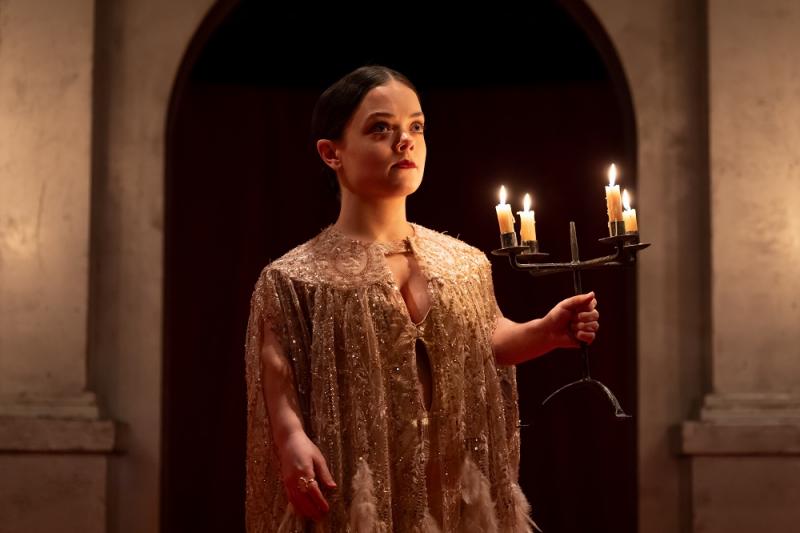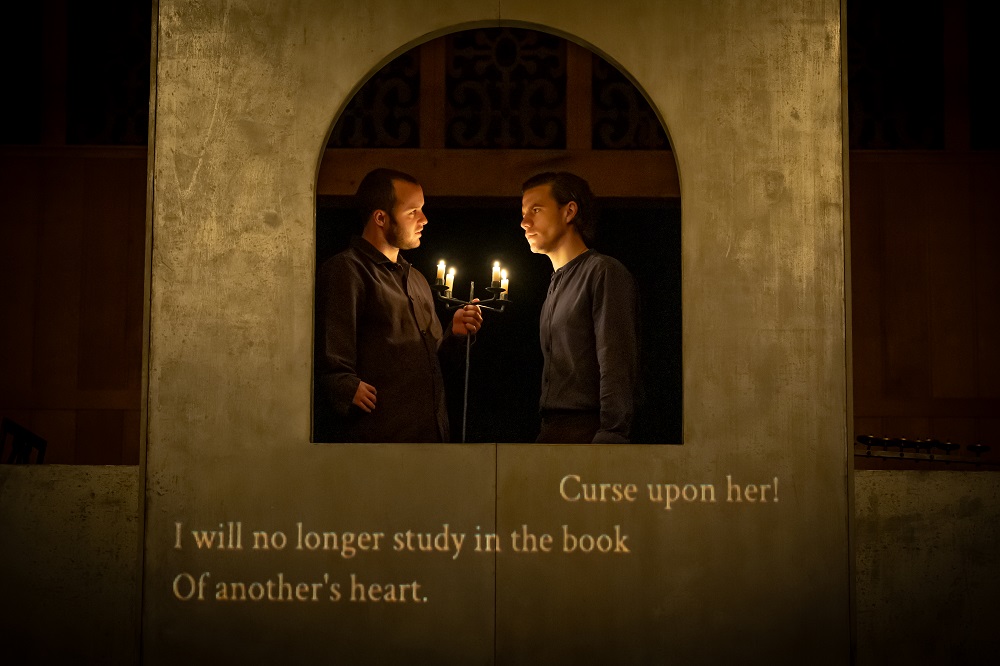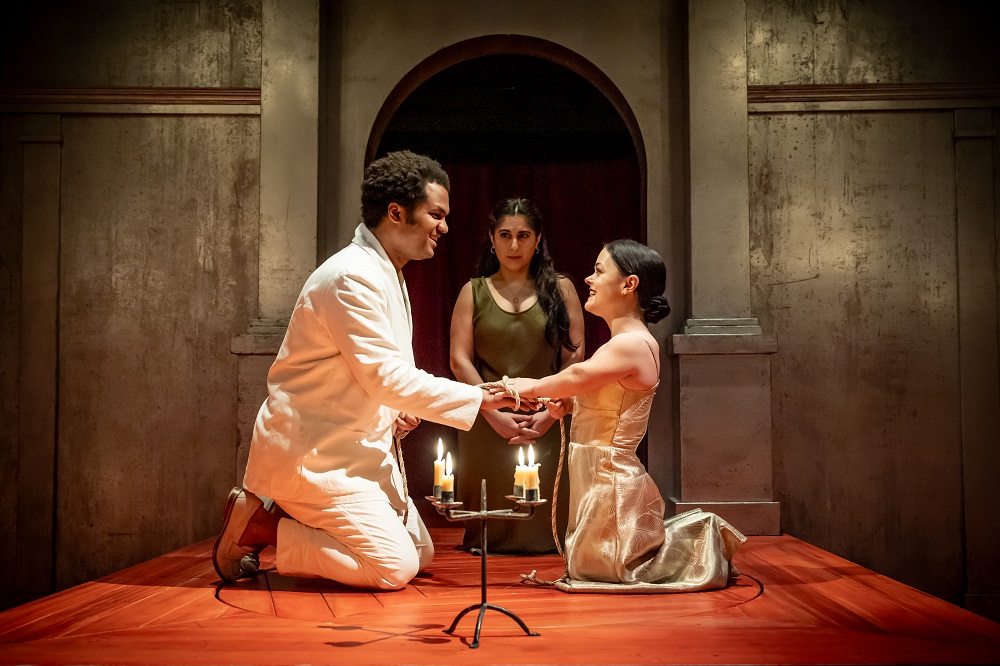The Duchess of Malfi, Sam Wanamaker Playhouse review - the good end badly, but act best | reviews, news & interviews
The Duchess of Malfi, Sam Wanamaker Playhouse review - the good end badly, but act best
The Duchess of Malfi, Sam Wanamaker Playhouse review - the good end badly, but act best
Francesca Mills' protagonist is the vivacious, truthful heart of this fascinating production

“All discord without this circumference,” the Duchess of Malfi tells the good man she’s just asked to be her husband, “is only to be pitied and not feared”. Perhaps the villains should be more feared and less pitied in the imbalanced casting of Rachel Bagshaw’s clear and yet still atmospheric new production of Webster’s supposed shocker.
It’s to Bagshaw’s credit and the riveting performances of Francesca Mills as the Duchess, Oliver Huband as her beloved Antonio and Shazia Nicholls as her faithful Cariola that good resonates more powerfully than evil here, even if two of them end up strangled and the third stabbed by mistake. Still, the other key actors surely go too easy on the psychotics. It’s vital to avoid Hammer House of Horror overkill on the Duchess’s two malign brothers, but you feel that Oliver Johnstone’s Ferdinand is too normal and low-key for the crazed monstrosities he inflicts on his twin sibling simply for marrying again, while Jamie Ballard’s Cardinal needs more of a powerful presence. Webster makes it difficult for anyone to make sense of Bosola, the hired assassin with too persistent a conscience, but Arthur Hughes (pictured below on the left with Johnstone) seems to pose too little a threat.  Those are the only reservations about this strong staging, though they’re problematic in the last long stretch of the drama after the Duchess’s murder when concentration flails a little and you wish the malefactors to rush more swiftly to their doom. The Sam Wanamaker Playhouse is surely as effective as the original Jacobean Blackfriars Theatre in exploiting candlelight and shadow for the unbearably claustrophobic later stages of the Duchess’s trials. From harmless beginnings, rife with interpolated lines and song to inject humour (and further misogyny), the tension escalates after the interval to the scene where Ferdinand asks his sister to take his hand and passes on to her a severed limb, carried out in near-total darkness.
Those are the only reservations about this strong staging, though they’re problematic in the last long stretch of the drama after the Duchess’s murder when concentration flails a little and you wish the malefactors to rush more swiftly to their doom. The Sam Wanamaker Playhouse is surely as effective as the original Jacobean Blackfriars Theatre in exploiting candlelight and shadow for the unbearably claustrophobic later stages of the Duchess’s trials. From harmless beginnings, rife with interpolated lines and song to inject humour (and further misogyny), the tension escalates after the interval to the scene where Ferdinand asks his sister to take his hand and passes on to her a severed limb, carried out in near-total darkness.
The chaos in which he unleashes madmen upon her sees the text projected on the back walls splinter and swirl, a brilliant development in a device which makes us “hear” the earthy language and animal similes of Webster’s very distinctive poetry and prose all the better. The production also has one of the best scores I've heard in a play over recent years, a quartet scored by Anna Clock with prominent roles for double bass and bass clarinet.  The meaning is exceptionally well delivered by the entire cast. Mills’s Duchess (pictured above with Huband and Nicholls) stands very much at its moral centre: vivacious in her reactions at court and in her playfulness with the man she courts, immensely courageous in facing her trials – all the more powerful for the presence of fear in her resolution (I was reminded of Evgenia Kara-Murza’s speech about fearfulness as not being absent but overcome in the resolutions of her husband’s and Navalny’s returns to certain imprisonment in Putin’s Russia). For all the weakness in characterisation when it comes to the bad men here, it’s good to find ethics playing so strong a role in Webster’s theatre of cruelty.
The meaning is exceptionally well delivered by the entire cast. Mills’s Duchess (pictured above with Huband and Nicholls) stands very much at its moral centre: vivacious in her reactions at court and in her playfulness with the man she courts, immensely courageous in facing her trials – all the more powerful for the presence of fear in her resolution (I was reminded of Evgenia Kara-Murza’s speech about fearfulness as not being absent but overcome in the resolutions of her husband’s and Navalny’s returns to certain imprisonment in Putin’s Russia). For all the weakness in characterisation when it comes to the bad men here, it’s good to find ethics playing so strong a role in Webster’s theatre of cruelty.
rating
Explore topics
Share this article
Add comment
The future of Arts Journalism
You can stop theartsdesk.com closing!
We urgently need financing to survive. Our fundraising drive has thus far raised £49,000 but we need to reach £100,000 or we will be forced to close. Please contribute here: https://gofund.me/c3f6033d
And if you can forward this information to anyone who might assist, we’d be grateful.

Subscribe to theartsdesk.com
Thank you for continuing to read our work on theartsdesk.com. For unlimited access to every article in its entirety, including our archive of more than 15,000 pieces, we're asking for £5 per month or £40 per year. We feel it's a very good deal, and hope you do too.
To take a subscription now simply click here.
And if you're looking for that extra gift for a friend or family member, why not treat them to a theartsdesk.com gift subscription?
more Theatre
 The Billionaire Inside Your Head, Hampstead Theatre review - a map of a man with OCD
Will Lord's promising debut burdens a fine cast with too much dialogue
The Billionaire Inside Your Head, Hampstead Theatre review - a map of a man with OCD
Will Lord's promising debut burdens a fine cast with too much dialogue
 50 First Dates: The Musical, The Other Palace review - romcom turned musical
Date movie about repeating dates inspires date musical
50 First Dates: The Musical, The Other Palace review - romcom turned musical
Date movie about repeating dates inspires date musical
 Bacchae, National Theatre review - cheeky, uneven version of Euripides' tragedy
Indhu Rubasingham's tenure gets off to a bold, comic start
Bacchae, National Theatre review - cheeky, uneven version of Euripides' tragedy
Indhu Rubasingham's tenure gets off to a bold, comic start
 The Harder They Come, Stratford East review - still packs a punch, half a century on
Natey Jones and Madeline Charlemagne lead a perfectly realised adaptation of the seminal movie
The Harder They Come, Stratford East review - still packs a punch, half a century on
Natey Jones and Madeline Charlemagne lead a perfectly realised adaptation of the seminal movie
 The Weir, Harold Pinter Theatre review - evasive fantasy, bleak truth and possible community
Three outstanding performances in Conor McPherson’s atmospheric five-hander
The Weir, Harold Pinter Theatre review - evasive fantasy, bleak truth and possible community
Three outstanding performances in Conor McPherson’s atmospheric five-hander
 Dracula, Lyric Hammersmith review - hit-and-miss recasting of the familiar story as feminist diatribe
Morgan Lloyd Malcolm's version puts Mina Harkness centre-stage
Dracula, Lyric Hammersmith review - hit-and-miss recasting of the familiar story as feminist diatribe
Morgan Lloyd Malcolm's version puts Mina Harkness centre-stage
 Reunion, Kiln Theatre review - a stormy night in every sense
Beautifully acted, but desperately grim drama
Reunion, Kiln Theatre review - a stormy night in every sense
Beautifully acted, but desperately grim drama
 The Code, Southwark Playhouse Elephant review - superbly cast, resonant play about the price of fame in Hollywood
Tracie Bennett is outstanding as a ribald, riotous Tallulah Bankhead
The Code, Southwark Playhouse Elephant review - superbly cast, resonant play about the price of fame in Hollywood
Tracie Bennett is outstanding as a ribald, riotous Tallulah Bankhead
 The Lady from the Sea, Bridge Theatre review - flashes of brilliance
Simon Stone refashions Ibsen in his own high-octane image
The Lady from the Sea, Bridge Theatre review - flashes of brilliance
Simon Stone refashions Ibsen in his own high-octane image
 Romans: A Novel, Almeida Theatre review - a uniquely extraordinary work
Alice Birch’s wildly epic family drama is both mind-blowing and exasperating
Romans: A Novel, Almeida Theatre review - a uniquely extraordinary work
Alice Birch’s wildly epic family drama is both mind-blowing and exasperating

Comments
Francesco? Surely it's
Francesco? Surely it's Antonio? Otherwise, a very perceptive review of an interesting production.
Thanks for drawing my
Thanks for drawing my attention to the error. Duly corrected.